On Thursday, October 25th, Dr. Peter Meilaender delivered his faculty lecture entitled “Why You Should Learn a Foreign Language: Confessions of a Homebody Traveller.” Faculty Lectures are a long standing tradition at Houghton in which Professors from all departments are invited present their current work in their field of study or simply on a topic which they are passionate about. Speakers in the past have presented on everything from Michelangelo to Antibiotics to the role of Organists in Worship. For his presentation, Dr. Meilaender gave his argument for why students ought to learn at least one or two foreign languages.
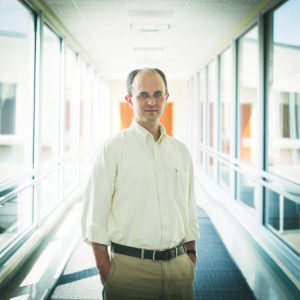
Dr. Meilaender opened by explaining that in the past decade, enrollment in all foreign languages at the University level has declined to its lowest level since the 1960s. This phenomenon is evidenced on our very own campus by the merging of the foreign language department with Intercultural Studies and the decline in foreign language courses offered. At this point French, German, Hebrew, and Greek are offered on rotating schedules at beginner levels, compared to even just two decades ago when Houghton offered more foreign language classes at various levels and multiple foreign language majors and minors.
This decline in enrollment might suggest that there is no longer value in studying foreign languages. Dr. Meilaender argued that this is not the case. Learning foreign languages is important for University students because, in the words of Austrian Philosopher Ludwig Wittgenstein, “the limits of my language means the limits of my world.” When we are only fluent in our own language, our world is limited to our own country and culture. Dr. Meilaender anecdotally explained his own experience of this phenomenon, as student who originally had no interest in other countries or cultures, but who learned German upon meeting the woman who is now his wife and discovering the positives of German culture and engineering. Today, Dr. Meilaender reaps the many benefits of being able to fully engage both American and German culture, which would be impossible if not for his fluency in German. Students can do the same because language is a prerequisite for learning about a culture.
Not only is “learning a foreign language an admission pass to another cultural universe” but it is one of the bests way to understand English grammar, is practical in jobs, and translation increases one’s facility for the use of language. With these reasons in mind, Dr. Meilaender proposes a vision in which each student is fluent in at least one language, preferably two (one modern language and one classical language.) This vision is not totally unrealistic considering the many tools at students disposal like Duolingo and Babbel, which offer quick language acquisition options or self-designed minors which provide an option for students desiring more academic fluency.
Dr. Meilaender concluded with the argument that learning a language can also be considered deeply Christian. According to the Bible there will be a day where people from every nation, tongue, and tribe will gather before the throne of God and worship him together. This means that in heaven we might all be able to understand one another “but,” to use Dr. Meilaender’s concluding words “there is no reason that we should not get a head start now.”
The lecture was received well by students and faculty. Many students, like Junior Emily Allen, attend and “appreciated Dr. Meilaender’s lecture and his whimsical approach to the serious topic of the life-changing effects of learning a foreign language.” Similarly, Dr. Sarah Derck, a foreign language professor herself, thought “Dr. Meilaender’s lecture today was winsome and insightful” and she “particularly appreciated the connections he drew between learning a foreign language and entering that culture.” The next lecture will be by Dr. Anna Pettway on November 15th at 4:25, entitled “#Existingwhileblack: The Psychological Burden of Anti-Black Racism.”

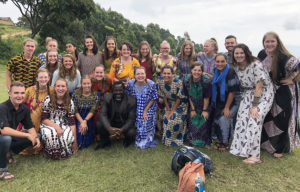 When not out exploring, students called the Masumbo campus home. It’s a spacious field shaded by huge umbrella acacia trees and complete with an open air picnic hut, the “Twiga”-where students had class, and tiny “bandas” (huts) where students lived in pairs. The Ruaha river flows close by and students spent their afternoons lounging by the rapids or soaring over the river on the zipline. Senior Maggie Clune offered this vivid description: “My place had turned into a muddy brown river with rocks lining the paths. It had Bandas running along the treeline and a giant thatch roof classroom with couches perfect for napping. My place was suddenly a little hut, filled with art, that monkeys jumped on the roof of to wake me up in the morning. It was where chipates [an African version of a tortilla] quickly turned into a campus favorite and our professors became our best friends. I had my home, I had Houghton, and now I had Tanzania…… Masumbo created a safe place for me to sit and think about but what the future will hold for me. It gave quietness and peace to work through the changes that would be made when I got home.”
When not out exploring, students called the Masumbo campus home. It’s a spacious field shaded by huge umbrella acacia trees and complete with an open air picnic hut, the “Twiga”-where students had class, and tiny “bandas” (huts) where students lived in pairs. The Ruaha river flows close by and students spent their afternoons lounging by the rapids or soaring over the river on the zipline. Senior Maggie Clune offered this vivid description: “My place had turned into a muddy brown river with rocks lining the paths. It had Bandas running along the treeline and a giant thatch roof classroom with couches perfect for napping. My place was suddenly a little hut, filled with art, that monkeys jumped on the roof of to wake me up in the morning. It was where chipates [an African version of a tortilla] quickly turned into a campus favorite and our professors became our best friends. I had my home, I had Houghton, and now I had Tanzania…… Masumbo created a safe place for me to sit and think about but what the future will hold for me. It gave quietness and peace to work through the changes that would be made when I got home.”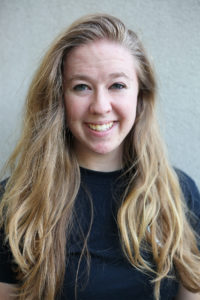 The answer, like most things in my life, starts with some nerdy history. Imagine yourself as a young student in Berlin in 1933, the year Hitler becomes the democratically elected chancellor of Germany. You don’t have the slightest inkling of the atrocities that this man is about to commit. In fact, by all accounts, he has given you and your country hope that none of you have felt anything like in your lifetime. Your university is flourishing with ideas and your church is vibrant.
The answer, like most things in my life, starts with some nerdy history. Imagine yourself as a young student in Berlin in 1933, the year Hitler becomes the democratically elected chancellor of Germany. You don’t have the slightest inkling of the atrocities that this man is about to commit. In fact, by all accounts, he has given you and your country hope that none of you have felt anything like in your lifetime. Your university is flourishing with ideas and your church is vibrant.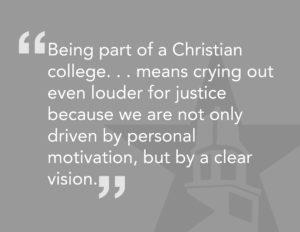 A Christian college is not meant to be a place where we are cloistered and hide behind our bibles. A Christian college is not meant to be a place where we retreat and leave the “heathen” culture to damn itself. A Christian college, like this college, is where we align our studies with a worldview that values the vulnerable, that demands more than just our best wishes for humanity, that grips us with the reality that we are commanded by Christ to institute a kingdom of compassion and love using the minds that we have been given. Being a part of a Christian college doesn’t mean forgoing your voice in society or culture; in fact, it means the opposite. It means crying out even louder for justice because we are not only driven by personal motivation, but by a clear vision for the kingdom of Heaven.
A Christian college is not meant to be a place where we are cloistered and hide behind our bibles. A Christian college is not meant to be a place where we retreat and leave the “heathen” culture to damn itself. A Christian college, like this college, is where we align our studies with a worldview that values the vulnerable, that demands more than just our best wishes for humanity, that grips us with the reality that we are commanded by Christ to institute a kingdom of compassion and love using the minds that we have been given. Being a part of a Christian college doesn’t mean forgoing your voice in society or culture; in fact, it means the opposite. It means crying out even louder for justice because we are not only driven by personal motivation, but by a clear vision for the kingdom of Heaven. 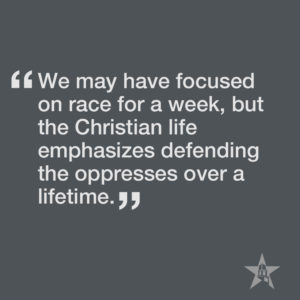 The
The